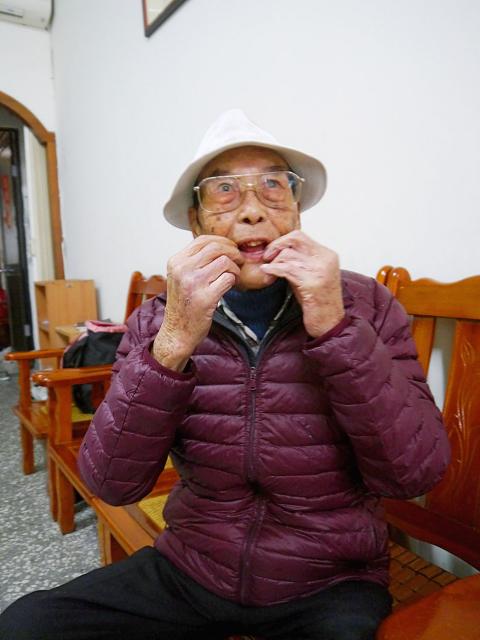Hsieh I-cheng (謝一誠), a 228 Incident victim, said that a certificate he is to receive today to restore his reputation cannot erase the pain and torture he experienced during his imprisonment.
Hsieh, 93, grew up in Taichung’s Beitun District (北屯) and was drafted to the transport unit of the Japanese military in Taichung when he was 19, where he became familiar with Taichung’s arsenal, he said.
On Feb. 28, 1947, the then-Chinese Nationalist Party (KMT) government violently suppressed a nationwide uprising against it and a series of bloody purges against civilians ensued in subsequent months. The event marked the beginning of the White Terror era that saw tens of thousands of people arrested, imprisoned and executed.

Photo: Chang Hsuan-che, Taipei Times
Hsieh said when he heard the crackdown had spread, he transported firearms and ammunition left behind by the Japanese military in an ammunition depot in Taichung’s Dakeng (大坑) to the downtown area to assist the militia.
On March 16, 1947, Hsieh was charged with theft and sentenced to death.
He spent more than two years in a jail in a military camp in Taichung’s Gancheng Borough (干城), he said.
“Those two years were a living nightmare,” he said.
Hsieh said that he shared a cell with 47 people and that they slept in shifts.
They were given a bowl of rice and two dishes per day and did not have enough water to drink, Hsieh said, adding that to survive the men drank each other’s urine.
During the night they were beaten with gunstocks and iron burns, given electric shocks and had buckets of cold water poured over their heads and forced into their mouths with hoses, Hsieh said.
Several times he feared that his stomach would explode, he said.
Hsieh said he was only dragged back to the cell after losing consciousness.
After two years and eight months, Hsieh was transferred to Taichung Prison, where he took his first shower since his imprisonment, he said.
After three-and-a-half years, Hsieh’s sentence was reduced and he was released, he said.
As his national identification card was marked with the Chinese characters for “228” (二 二 八) in red, he was required to report to the police every month, he said, adding that he had trouble finding a job until a relative working at the Household Registration Office told him to destroy his old national identification card and request a new one.
Originally named Hsien Yan-shan (謝炎山), Hsieh said he changed his name in the hope of starting a new life.
Hsieh said the Incident had a huge effect on his life
He took pain medication for decades after the torture, which lead to side effects, he said.
When he passes Dakeng today, he often thinks of the ammunition depot, he said.
He chose the numbers “228” as the last three digits of his cellphone number to remind himself of what had happened, he said.
This overdue certificate means nothing, Hsieh said, adding that he did what he did during the Incident because he loved Taiwan.

The Ministry of Education (MOE) is to launch a new program to encourage international students to stay in Taiwan and explore job opportunities here after graduation, Deputy Minister of Education Yeh Ping-cheng (葉丙成) said on Friday. The government would provide full scholarships for international students to further their studies for two years in Taiwan, so those who want to pursue a master’s degree can consider applying for the program, he said. The fields included are science, technology, engineering, mathematics, semiconductors and finance, Yeh added. The program, called “Intense 2+2,” would also assist international students who completed the two years of further studies in

Former president Tsai Ing-wen (蔡英文) departed for Europe on Friday night, with planned stops in Lithuania and Denmark. Tsai arrived at Taiwan Taoyuan International Airport on Friday night, but did not speak to reporters before departing. Tsai wrote on social media later that the purpose of the trip was to reaffirm the commitment of Taiwanese to working with democratic allies to promote regional security and stability, upholding freedom and democracy, and defending their homeland. She also expressed hope that through joint efforts, Taiwan and Europe would continue to be partners building up economic resilience on the global stage. The former president was to first

Taiwan will now have four additional national holidays after the Legislative Yuan passed an amendment today, which also made Labor Day a national holiday for all sectors. The Chinese Nationalist Party (KMT) and Taiwan People’s Party (TPP) used their majority in the Legislative Yuan to pass the amendment to the Act on Implementing Memorial Days and State Holidays (紀念日及節日實施辦法), which the parties jointly proposed, in its third and final reading today. The legislature passed the bill to amend the act, which is currently enforced administratively, raising it to the legal level. The new legislation recognizes Confucius’ birthday on Sept. 28, the

MORE NEEDED: Recall drives against legislators in Miaoli’s two districts and Hsinchu’s second district were still a few thousand signatures short of the second-stage threshold Campaigners aiming to recall Chinese Nationalist Party (KMT) legislators yesterday said they expect success in 30 out of 35 districts where drives have passed the second-stage threshold, which would mark a record number of recall votes held at once. Hsinchu County recall campaigners yesterday announced that they reached the second-stage threshold in the recall effort against Legislator Lin Szu-ming (林思銘). A total of 26,414 signatures have been gathered over the past two months, surpassing the 10 percent threshold of 23,287 in Hsinchu County’s second electoral district, chief campaigner Hsieh Ting-ting (謝婷婷) said. “Our target is to gather an additional 1,500 signatures to reach